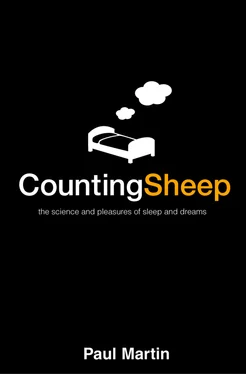To compare the effects of sleep deprivation and alcohol, researchers persuaded healthy young men to drive a simulator while under the influence of varying degrees of sleepiness and with varying blood-alcohol levels of up to 0.08 per cent. (For comparison, the legal limit for driving in most countries is 0.08 per cent blood alcohol and in Scandinavian countries it is 0.05 per cent.) Alcohol undermined their ability to maintain a suitable speed and road position, and so did sleep deprivation. Drivers who had been awake for 21 hours (hardly a remarkable feat) performed as badly as drivers with a blood-alcohol level of 0.08 per cent. So, next time you miss a night’s sleep, try to remember (if you can) that your driving ability will be as bad as if you had a blood-alcohol level that would be illegal in most countries.
Recent research has underlined the parallel between tiredness and alcohol. Scientists assessed volunteers driving on a closed course, both after drinking alcohol and after sleep deprivation. Detailed comparisons showed that both acute sleep deprivation (one night with no sleep) and chronic sleep deprivation (two hours less sleep than normal each night for a week) caused impairments in performance and reactions that were almost indistinguishable from those caused by illegally high blood-alcohol levels. The inescapable conclusion is that even relatively modest sleep deprivation, of the sort that many people experience in everyday life, has potentially dangerous consequences. Shaving a couple of hours off your sleep each night for a week can make you as incapable behind the wheel as a drunk driver.
Another striking similarity between sleep deprivation and alcohol is that as well as impairing our performance, sleep deprivation also undermines our ability to realise that our performance has been impaired, as we shall shortly see. (Try saying that sentence quickly when you are tired or drunk.) Tired people, like drunk people, have a misplaced confidence in their own abilities. This dangerous trait was highlighted in an experiment in which students took cognitive tests after they had been deprived of sleep for 24 hours. Predictably, they performed worse than subjects who had slept well the night before. However, when asked to assess their own performance, the sleep-deprived subjects awarded themselves higher ratings than did the non-deprived subjects. Tiredness had marred their ability to appreciate their own inability.
Cultural attitudes towards being tired or drunk behind the wheel of a car are very different, despite the fact that the net outcomes are remarkably similar and sometimes fatal. Driving when drunk is illegal and (nowadays) socially unacceptable, whereas driving when tired is neither. People still boast about their feats of sleep-deprived driving, in the way that people once boasted of their ability to drive after downing stupefying quantities of booze. Of course, one big difference between drinking alcohol and going without sleep is that drinking alcohol is enjoyable. Sleep deprivation has only the bad bits to offer, including the hangover.
Being tired and drinking alcohol are obviously not mutually exclusive. Indeed, the two often go hand in hand. A night on the town is often a night of little sleep. What is more, they reinforce each other. Tiredness amplifies the effects of alcohol and vice versa. It is a common experience (except presumably among lifelong teetotallers) that alcohol packs a heftier punch when we are tired – say, at the end of a hectic working week. Even moderate amounts of alcohol produce a big sedative effect after insufficient sleep. Conversely, the effects of alcohol are somewhat blunted if you are well rested. Experiments have found that alcohol reduces the alertness of people who have had less than eight hours’ sleep the previous night, whereas the same amount of alcohol makes no difference if they have had unlimited sleep. If you want to enjoy a few drinks without wilting, make sure you sleep properly the night before.
Another common experience is that the effects of alcohol vary according to the time of day when it is drunk. This happens because alcohol reinforces our natural circadian rhythm in sleepiness, exaggerating the troughs in alertness that normally occur in the early hours of the morning and again in the afternoon. Alcohol consumed at lunchtime or in the early afternoon therefore tends to have a bigger impact than the same amount consumed in the early evening, when alertness is normally higher. Lunchtime boozing really is more likely to make you fall asleep at your desk or crash your car than those pre-dinner ‘sharpeners’.
Scientists have also uncovered some intriguing parallels between sleep deprivation and the normal ageing process. As we grow older, our performance declines on many psychological and neurological measures. A similar pattern of deterioration is observed in young people after sleep deprivation. One experiment found that after 36 hours without sleep, adults in their twenties had a performance profile similar to that of non-sleep-deprived people aged about 60. So, if you are in your twenties and you want to know how it feels to have the brain of a healthy 60-year-old, just stay up all night. Then you will know. The reason why ageing and sleep deprivation exert similar effects may be because they both impair the functioning of the prefrontal cortex, a region of your brain that is extremely active when you are awake.
To complete the three-way permutation, alcohol and old age make an unpleasant cocktail. Being old is generally bad for sleep, and so is being an alcoholic. Being old and alcoholic is even worse. The elderly are more prone to insomnia, as we shall see in a later chapter. Alcoholism is also accompanied by sleep problems. And when old age and alcoholism combine within the same person they reinforce their malign influences on sleep. Researchers have found that older alcoholics have significantly worse sleep problems than younger alcoholics.
Sleep, or lack of it, can also affect physical appearance – a belief encapsulated in the term ‘beauty sleep’. Although sleeping all hours will not necessarily make you more beautiful, prolonged lack of sleep will detract from your physical charms. Animals that have been experimentally deprived of sleep for long periods develop unsightly skin disorders. Lack of sleep in humans, especially adolescents and young adults, might exacerbate skin problems such as acne. Sleep deprivation weakens the ability of the skin to maintain its normal protective functions as a barrier against dirt and microbes. That said, the scientific evidence for a direct causal link between sleep and an unblemished complexion remains sparse, Sleeping Beauty notwithstanding.
Lack of sleep probably does contribute to the depressing tendency of men to become pot-bellied and flabby in middle age. In men (but not women) almost the entire day’s production of growth hormone within the body occurs during sleep. The less sleep a man gets, the less growth hormone his body produces. As part of the normal ageing process, the total amount of sleep and the production of growth hormone both decline in parallel. Scientists have suggested that this age-related fall in growth-hormone production could be responsible for the systematic replacement of muscle by flab, better known as middle-aged spread. If so, dwindling sleep might be an important ingredient in the expanding waistline, double chins and spindly legs that help to make male middle age such a joy.
I’ll wake mine eyeballs out.
William Shakespeare, Cymbeline (1609–10)
What happens to people if they get no sleep at all for a long time? One of the first scientific experiments on sleep deprivation dates from 1896, when Professor G. T. W. Patrick and his colleague Dr Allen Gilbert of the Iowa University Psychological Laboratory kept three volunteers awake for 90 hours. Patrick and Gilbert charted the now classic signs of prolonged sleep deprivation, including progressive deteriorations in reactions, memory and sensory acuity, together with a decline in body temperature.
Читать дальше












